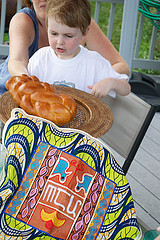Rachel Barenblat's Blog, page 183
July 28, 2013
An historic synagogue in Rhode Island
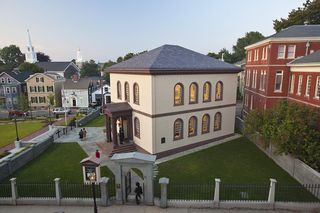 Stepping inside the Touro Synagogue feels a little bit like stepping inside an Old World Sefardic shul. There's a good reason for that. All of the oldest congregations in the New World were founded by Sefardic Jews, including this one.
Stepping inside the Touro Synagogue feels a little bit like stepping inside an Old World Sefardic shul. There's a good reason for that. All of the oldest congregations in the New World were founded by Sefardic Jews, including this one.
There's no mechitza; instead there's an upstairs section and a downstairs one. The bimah (pulpit) from which the shaliach tzibbur (prayer leader) leads prayer and reads Torah is in the middle of the sanctuary, almost in the back, so he's leading from within/among the community, not standing in front of them Protestant-style. The ceiling is lofty and painted and ornamented in simple, elegant Colonial fashion. There are twelve big columns (one for each of the twelve tribes, naturally) and twelve smaller ones in the women's gallery above.
It is, I learn when we visit, the oldest still-standing synagogue in North America. (There was one founded earlier, in what was then New Amsterdam, though it burned down. It was rebuilt and the congregation is still extant, as is this one, but that makes this the oldest still-standing Jewish worship space in the country.) The community is celebrating its 250th anniversary this year.
Two hundred and fifty years may be a mere eyeblink in terms of human history -- certainly there are many European houses of worship older than that! -- but for a house of worship on these shores, 250 years is a very long time. And somehow there's something extra-special about being in a North American synagogue which is that venerable.
Its history is really cool. The first Jews came to Newport in 1658, of Spanish and Portuguese origin. (You might recall that Jews were unilaterally cast out of Spain in 1492. Thanks a ton, Ferdinand and Isabella.) Some of them came from Curaçao, and for a bit of a first, they came because they were interested in the colony's experiment in religious liberty, not because they had just been kicked out of where they'd been living. Rhode Island's colonial charter said, among other things:
No person within the said Colony, at any time hereafter, shall be any
wise molested, punished, disquieted, or called in question, for any
differences in opinion, in matters of religion, who does not actually
disturb the peace of our said Colony ; but that all and every person and
persons may, from time to time, and at all times hereafter, freely and
fully have and enjoy his own and their judgments and consciences, in
matters of religious concernments, throughout the tract of land
heretofore mentioned, they behaving themselves peaceably and quietly and
not using this liberty to licentiousness and profaneness, nor to the
civil injury or outward disturbance of others
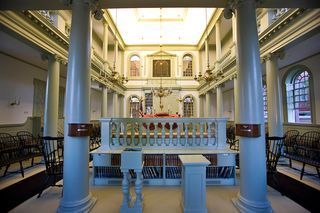 It's worth remembering that the Puritans of the Massachusetts Bay Colony banned Catholics in 1647, and weren't particularly fans of Quakers, Baptists, or Anglicans either. In Colonial days, suspicion of "Jews, Turks and Infidels" was pretty standard fare. But Rhode Island set out to be different, and that attracted a handful of Jewish families from early on.
It's worth remembering that the Puritans of the Massachusetts Bay Colony banned Catholics in 1647, and weren't particularly fans of Quakers, Baptists, or Anglicans either. In Colonial days, suspicion of "Jews, Turks and Infidels" was pretty standard fare. But Rhode Island set out to be different, and that attracted a handful of Jewish families from early on.
In its earliest years the community davened in each others' homes. They began constructing a building in 1758. The architect, an English fellow named Peter Harrison, had never seen a synagogue before. (Most non-Jews probably hadn't.) He designed the interior based on what he learned from the community's prayer-leader, Reverend Isaac Touro, who had recently emigrated from Amsterdam and had been part of that city's great Portuguese synagogue.
During the American Revolution, many of Newport's homes were destroyed by the British army (not only because pillaging is a time-honored form of wartime violence, but also because the houses were wooden and New England winters could be awfully cold -- the troops needed firewood.) Our tour guide confided in us that Touro himself was a Loyalist, rather than a supporter of the Revolution. One way or another, he convinced the local British invaders not to burn the synagogue but to use it as their field hospital. Its beautiful chandeliers and brass fixings went to New York for safekeeping until after the war, and the sanctuary became a place where the wounded could convalesce.
After the revolution was over, when the new president George Washington was traveling the colonies in hopes of getting the Bill of Rights passed, the congregation's then-leader Moses Mendes Seixas wrote to the president pressing him on the question of whether non-Christians truly had the right to worship in this country as we pleased. In response, President Washington wrote a fairly remarkable letter. He wrote, in part:
It is now no more that toleration is spoken of as if it were the indulgence of one class of people that another enjoyed the exercise of their inherent natural rights, for, happily, the Government of the United States, which gives to bigotry no sanction, to persecution no assistance, requires only that they who live under its protection should demean themselves as good citizens in giving it on all occasions their effectual support...
May the children of the stock of Abraham who dwell in this land continue to merit and enjoy the good will of the other inhabitants—while every one shall sit in safety under his own vine and fig tree and there shall be none to make him afraid.
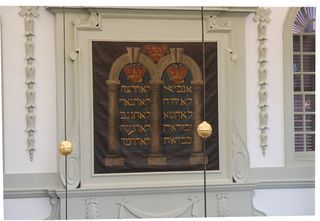 To bigotry no sanction, to persecution no assistance. It's not just a matter of the privileged "tolerating" otherness. At our best, our nation has always been about something better than that. (Indeed: the first item in that Bill of Rights which President Washington was trying then to pass is a clause enshrining freedom of religion in this nation.)
To bigotry no sanction, to persecution no assistance. It's not just a matter of the privileged "tolerating" otherness. At our best, our nation has always been about something better than that. (Indeed: the first item in that Bill of Rights which President Washington was trying then to pass is a clause enshrining freedom of religion in this nation.)
The Touro synagogue is a relatively modest structure, though a very lovely one. (I particularly like the mural of the ten commandments over the ark, and seeing the community's antique Torah scroll, now behind glass -- it's more than 500 years old, written on deerskin.) What makes it most remarkable to me is the realization that for two hundred and fifty years, people of my religious tradition have been gathering there in joy and in sorrow, davening the daily and weekly, monthly and yearly liturgies. It's sanctified by its very longevity.
And it feels holy to me because it's an early symbol of the religious liberty which is so foundational to this country. It was by no means obvious, two hundred and fifty years ago when this nation was new, that all people would be free to worship here as we pleased; that this wasn't simply a place where Christians of one stripe or another could be free from the prejudices of other Christians, but a place where Jews and Muslims, Hindus and Sikhs, people of every religious persuasion and of no religious persuasion whatsoever could together form the fabric of a nation where we walk in our own paths and cherish our differences.
I'm glad to have had the chance to sit, however, briefly, in this hallowed space. On my way out the door, I said a silent prayer of gratitude for its existence and for the principles of religious freedom which allowed it -- and every other community in this nation -- to flourish.
Photos from this gallery.
July 26, 2013
Shabbat shalom to all!
Drew and mama make motzi. Photo by David Curiel.
Every Friday, I post on my synagogue's Facebook page, "Shabbat is coming! Get ready for that extra soul to descend and enliven you..." I love the idea that we each receive a second portion of soul, a neshamah yeteirah, on Shabbat. An extra spiritual spaciousness. An opportunity to breathe deeply and open up our heartspace.
There's an old story which says that every Friday, an angel looks in through the window at each household. If that angel sees familial strife, dirty dishes, tension and frustration, the angel sorrowfully says, "...may next week be just like this one."
But if the angel sees a set table, a family relating to each other with loving harmony, candles and challah and grape juice or wine, the angel joyfully says, "...may next week be just like this one!"
As we move toward Shabbat today, may each of us find the resources we need (both practical and spiritual) to reach a state of readiness -- so that when that angel peers in at us, it is able to offer the blessing that our Shabbat joy should continue, now and always.
Shabbat shalom!
July 24, 2013
A poem after a summer funeral
FUNERAL AFTER TISHA B'AV
The windshield wipers sway from side to side
like whip-thin Hasidim shuckeling in prayer.
I traverse Silver and Old Orebed, roads named
after gashes in the flesh of the earth.
When the clouds relent, I lead the pallbearers
and their purple-draped cargo: two steps, pause.
Two steps, pause. Seven stops in all, one
for each day of the first week of creation.
Sweat beads on my back inside my black suit
like the water pooling atop the funeral home tent.
On behalf of a woman I never knew I ask forgiveness
and offer it in turn, untying her tangles.
We stand in silence as the shovels spear the dirt
and send it thudding down like arhythmic drums.
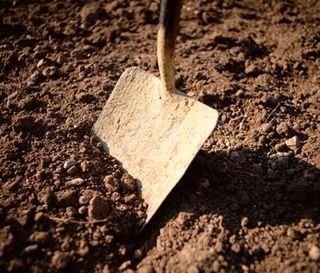 It's customary to make seven stops on the way to the graveside. Explanations for this practice vary.
It's customary to make seven stops on the way to the graveside. Explanations for this practice vary.
When I lead funerals, I recite the deathbed vidui on behalf of the person who has died. Tradition says that the soul of the deceased lingers until burial. Reciting the vidui may be a way of helping that soul to let go.
At Jewish funerals, the mourners always begin filling in the grave -- either with handfuls of soil, or with shovels. Some have the custom of using the shovel upside-down, because burying a loved one shouldn't be easy.
I'm always grateful to have the opportunity to serve at a funeral. There is something incredibly meaningful for me about being able to do this work.
July 23, 2013
Blessing after the haftarah - abridged / erased
Blessed source
of all time and space
in every generation
You are faithful.
Be compassionate,
life-giving, home.
Bring joy to our hearts.
Let us not be misled.
You have promised
light.
Thank You for
remembrance
thank You
for everything
Let Your name be blessed
source of all the earth.
I've been spending some time lately with the blessings recited in my shul after the haftarah reading during the Days of Awe. Although my shul does not read haftarah on a regular basis, we do read the haftarot on the Days of Awe, and on those days, I generally chant the blessings before and after the reading. (They're here in Hebrew; I can't seem to find them online in English, oddly.)
It occurred to me that I could take the text of that traditional set of blessings, and work with it using the erasure techniques I've learned from Dave Bonta. (I've done this once before -- as one of my 30 poems from this past month of April, now collected in April Daily.) I liked the result, so I'm sharing it here.
If you use this in your shul as a variation on the traditional blessings, let me know how it goes. Below the cut: the full text of the traditional blessings in English, for comparison.
Blessing after the haftarah on Rosh Hashanah (English)
Blessed are You, Adonai our God, source of all, rock of all time and space, righteous in every generation, the faithful God whose word is deed, who speaks and establishes, whose every word is truth and justice.
You are faithful, Adonai our God, and faithful is Your word. Not a single word You have spoken goes unfulfilled, for You are God, faithful, just (and merciful). Blessed are You, Adonai our God, faithful in all ways.
Be compassionate upon Zion, for it is a life-giving home for our people. Restore her soon. Blessed are You, Adonai, who brings rejoicing to Zion and her children.
Adonai our God, let us rejoice in the fulfillment of our dream of Elijah and David. Let redemption come soon and bring joy to our hearts. Let us not be misled by false prophets, for You have promised that redemption’s light shall never be extinguished. Blessed are You, Adonai, shield of David.
We thank You for the Torah and worship, for the prophets, (for this Shabbat), and for this Day of Remembrance that You have given us, Adonai our God (for holiness and rest,) for honor and splendor. We thank You for everything, Adonai our God. Let Your name ever be blessed by all that lives. Your word is true forever. Blessed are You, Adonai, source of all the earth, who sanctifies (Shabbat,) the people Israel and the Day of Remembrance.
July 22, 2013
Tu B'Av, the end of being "grounded," and accessing God's love
 Today is the fifteenth of the lunar month of Av. The beautiful moon is round and full. And in Jewish tradition, this date -- 15 Av, or Tu B'Av -- is a day of rejoicing.
Today is the fifteenth of the lunar month of Av. The beautiful moon is round and full. And in Jewish tradition, this date -- 15 Av, or Tu B'Av -- is a day of rejoicing.
The Gemara (Taanit 30b-31a) offers six reasons why Tu B'Av is a joyous day. Of those six reasons, here's the one which speaks most to me this year: when the Israelites were wandering in the wilderness for forty years, 15 Av was the day on which those who were destined to die in the wilderness finished dying. On this date, the intimacy with which the Holy One of Blessings spoke with Moshe was restored, and as a result, blessing flowed to the entire nation.
I can't speak to the historical veracity of that story, but on a spiritual level I find it very moving. It tells me that the relationship between God and the people was so badly strained by the incident with the scouts (where the scouts went into the Promised Land but returned with a fearful verdict instead of trusting in God), and by God's response to that incident (declaring that this whole generation which had known slavery would perish in the wilderness), that until the karmic consequences were complete, they couldn't really connect to each other.
It's like what happens when a child misbehaves, and the parent gets angry and declares a punishment, and then both parties feel distant from each other until the punishment is complete. A parent grounds a teenager, and during the period of the grounding, their connection isn't quite working. The parent knows the grounding was the right thing to do, but once the initial anger wears off, the parent suffers from the distance between them, too. And then the period of being grounded is over, and they can relate to each other in a different way again.
The "grounded" metaphor may seem a bit frivolous, but there's also a connection between this day and the actual ground. Here's a midrash:
R. Levi said: On every eve of the 9th
of Av (during the 40 years when the Israelites wandered in the wilderness)
Moses used to send a herald through the camp and announce: Go out
to dig graves. They would go out and dig graves and sleep in them.
In the morning he would send a herald and say: Separate the dead
from the living.” They would arise and find their number diminished.
In the last of the forty years, they did this but found themselves
undiminished. They said; we must have made a mistake in counting.
They did the same thing on the tenth, eleventh, twelfth, thirteenth,
fourteenth, and fifteenth, but still no one died. When the moon
was full, they said; it seems that the Holy One has annulled the
decree from all of us, so they made the fifteenth a holiday. —Lamentations
Rabbah, Prologue 13
This midrash takes place while the Israelites were wandering in the wilderness. Each year, the people dug themselves graves and lay down in the graves, expecting to die. One year, they stayed there until the full moon, whereupon they realized that if God had not yet taken them, the "plague" of being condemned to die in the wilderness must be over and God must have forgiven them for the misdeeds of the scouts. So on this date, they emerged from the earth -- literally rising up from the ground in which they had lain all week. Today is a day of great rejoicing because it's the day on which our people realized we had been wholly forgiven.
On this date, says the Talmud, the last members of the generation who had known slavery died. The last connection to slavery and to constriction was released. And the punishment which God had declared was finished. As a result, God was newly able to speak with Moshe intimately again, and to pour blessings through Moshe into the whole people. I imagine God saying, "That was no fun for either one of us; I'm so glad that's over; let me shower you with love from now on!"
On this Tu B'Av, may we all find ourselves able to shed the last vestiges of whatever has been constricting us -- and may we find a new way to relate to God and to each other, steeped in abundant blessings and love.
For more on this: Happy Tu B'Av, 2011, a post which explores the custom of dancing in the vineyards in white dresses, Rabbi Jill Hammer's teaching that this day is a hinge between harvest and fruition, the feminist undertones of a sex-positive Jewish festival, and a teaching from Michael Strassfeld.
Image borrowed from Tu B'Av: the Love Connection.
July 19, 2013
A poem for Shabbat by Danny Siegel
Erev Shabbas
by Danny Siegel
It's so stupid,
Wednesday afternoon,
soaked in the idiotica of errands
and all those "things to do"
that steal a man's minutes, his years --
I forgot the Queen.
Her Majesty was due at four-eighteen
on Friday, not a minute later,
and I was wasting hands, words, steps,
racing to a rushing finish-line
of roaring insignificance
I just as well could fill
with preparations for the royal entourage:
cleaning and cleansing each act's doing,
each word's saying,
in anticipation of the Great Event of Shabbas.
Who am I that she should wish
to spend the day with me?
I dry out my strengths, cook, move dust,
casually insensitive to all the songs
reminding me that she, the Queen,
in diamond-ruby-emerald-glow tiara,
would come to grace my table.
She comes,
no matter how the week was spent,
in joy or in silliness,
yet she comes.
And I am her host,
laying a linen flower tablecloth
that is white,
that is all the colors of the rainbow.
This is the Jews' sense of royalty:
she never does not spend one day a week
with me, and every Jew,
in the open air of freedom,
or lightening the misery of prisoners
in stinking Russian prisons
or the ghettoes of Damascus.
Come, my Shabbas Queen,
embodiment of Worlds-to-Be:
Your gracious kindness is our breath of life,
and though we once, twice, all-too-often
fail to say, "how beautiful your cape!
How lovely your hair, your Shechina-eyes!"
we will not always be so lax,
apathetic to your grace, your presence.
Touch us again this week
with your most unique love's tenderness,
and we shall sing to you our songs,
dance our dances in your honor,
and sigh for you our sighs
of longing, peace, and hope.
Found in A Shabbat Reader, ed. Dov Peretz Elkins (available on Amazon.) Shabbat shalom to all!
July 18, 2013
The first Shabbat back home
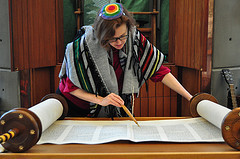 It's always a little bit hard to come home from the ALEPH Kallah. I love home! I love my family; I love my little shul; I love my smalltown life. But there is always a pang, a twinge, at leaving a community of hundreds of dedicated Jewish Renewalniks who care as much as I do about Judaism, about spiritual life, about healing creation.
It's always a little bit hard to come home from the ALEPH Kallah. I love home! I love my family; I love my little shul; I love my smalltown life. But there is always a pang, a twinge, at leaving a community of hundreds of dedicated Jewish Renewalniks who care as much as I do about Judaism, about spiritual life, about healing creation.
This past Saturday morning when Shabbat services began we were only two people. I breathed deeply and told my one congregant that even if it were just us, we would have a perfectly sweet service. It's a beautiful July day; people are on vacation; it can be hard to muster a minyan in a small town in high summer. I know this, and it's okay.
But then another couple arrived. And someone else. And someone else. And then just as we were about to reach the amidah, we broke the minyan barrier and were able to daven the amidah aloud, and to read from the Torah scroll. I got to give blessings for the various aliyot. We said prayers for healing. We recited mourner's kaddish in the comforting presence of community.
We had a glorious kiddush, with fresh strawberries and dill crackers. And then we sat around the table and studied the haftarah reading for last week, Isaiah 1:1-27, and talked about theologies of trauma and teshuvah, and about God as the angry parent, and about redemption, and about how prayer doesn't mean much unless we back it up with ethical living.
It was so beautiful and so sweet! We may not have the combined energy of 600 Shabbat-blissed Renewalniks, but what we're doing is cut from the same holy cloth. I'm so grateful to be serving this community. I'm so grateful that this is what I get to do.
July 17, 2013
A poem after Tisha b'Av
WATER FROM THE SOURCE
No blessing is so fervent
as the one over water
fresh from the faucet
adorned with ice cubes
and a quarter of a lemon
at the end of Tisha b'Av.
The crunch of snap peas
cold from the fridge
and sweet as sugar
their texture, crisp
and bright against the tongue
almost brings me to tears.
A day immersed in trauma,
the fallen temple of justice
mothers wailing for their sons --
our fast can't bring
children back to life,
rebuild what is broken.
But it reminds me
people know this emptiness daily
and have nothing to eat.
And that other hunger
for an end to prejudice,
for a world redeemed...
God, rouse my thirst
for righteousness. Make me
care for this damaged world.
 This poem's title comes from the Hebrew song וּשְׁאַבְתֶּם-מַיִם בְּשָׂשׂוֹן / ushavtem mayim b'sasson [here on YouTube], which is a setting of Isaiah 12:3.
This poem's title comes from the Hebrew song וּשְׁאַבְתֶּם-מַיִם בְּשָׂשׂוֹן / ushavtem mayim b'sasson [here on YouTube], which is a setting of Isaiah 12:3.
(See also Amos 5:24, "Let justice flow like waters, righteousness like a mighty stream.")
It is traditional Jewish practice to fast from both food and water during Tisha b'Av, when we remember the two fallen Temples and mourn the brokenness of creation.
On "the fallen temple of justice" and "mothers wailing for their sons," see: George Zimmerman, Not Guilty: Blood on the Leaves by Jelani Cobb in the New Yorker and Trayvon Martin and the Irony of American Justice by Ta-Nehisi Coates in the Atlantic.
Image credit: by gnuckx, licensed under Creative Commons.
As we move now into the seven weeks of consolation between Tisha b'Av and Rosh Hashanah, may our Tisha b'Av galvanize us to build a more healed and redeemed world.
July 16, 2013
An internet parable about kindness for Tisha b'Av
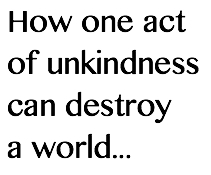 When one person is unkind to another, a whole world can be destroyed.
When one person is unkind to another, a whole world can be destroyed.
Once there was a woman who belonged to an intimate and dedicated online community, where for many years people had congregated to share their writing and to support each other through life's troubles and travails.
She had a friend in that community named Jane, and an enemy named Janeway. One day she decided to throw a party in IRC, and she invited members of the community. She meant to invite her friend Jane, but her email program auto-filled the wrong email address and the invitation went to Janeway instead.
So the party got underway, people were hanging out and watching streaming video and having a blast -- and the host noticed Janeway's nick in the list of participants. She was incensed, and instead of yelling at Janeway in a private channel, she accosted her in all-caps where everyone could see. "YOU! You tell untrue stories about me," she wrote. "What are you doing here? GET OUT!"
Janeway typed, "Look, I'm already here -- let me stay, and I'll chip in toward the costs of the party." The woman said, hell no. "Then let me pay for half of the party," Janeway wheedled. No, said the woman. "Then let me pay for the whole thing," Janeway offered. With no further ado, the woman publicly booted Janeway from the chat server and password-protected the room so she couldn't get back in.
Janeway saw that all of the moderators from the writing community's forum were there, watching the whole imbroglio, and no one stepped up to temper the party host's unkind behavior. She felt ashamed and she was angry, and she wanted revenge.
So she went to the ISP that hosted the online community, and said, "those people are nothing but trouble." The site admins said, prove it. Janeway advised, "Give me something to post in their forum, which is supposed to be open to everyone. If they don't publish it, you'll know they're doing something wrong." The ISP gave her something to submit on their behalf to the forum. But Janeway added a sentence which she knew would be objectionable to the moderators, and then passed it along to the forum moderators as a PDF file which they could not edit.
The moderators were in a bind. Some of them were inclined to publish it anyway, in order not to offend the ISP. But then one of them said, "You can't do that! People will say we're publishing objectionable material, and that will ruin our credibility!" Someone else quipped, maybe we should arrange to toast Janeway's email account so she can't go running to the ISP to tattle on us. But the moderator pointed out that that was excessive, and they really shouldn't do that, either.
Meanwhile, the ISP noticed that the post hadn't gone live. They took this as proof that Janeway had been telling the truth. So they deleted the forum, destroying years upon years of community and communication, creativity and friendship.
One of the moderators sent an email to another, saying: "Because that mod wouldn't let us relax our principles and publish the ISP's message, our online home has been destroyed."
Though between you and me, I think it's the fault of the woman who humiliated Janeway. If she had been kind to her enemy, then Janeway wouldn't have been publicly embarrassed -- and she wouldn't have had the experience of seeing the moderators of the forum sit idly by as she was mistreated -- and she wouldn't have gone to the ISP to get revenge against the community -- and perhaps their beloved online home would still be standing.
(Adapted from Talmud, Gittin 55b-56a. Retelling that story in this vernacular requires a bit of a stretch, but I think the central message still holds true. For a more traditional perspective, try Kamtza and bar Kamtza, or Kamtza and Bar Kamtza: A Fresh Take on a Familiar Story.)
July 15, 2013
Tisha b'Av begins tonight
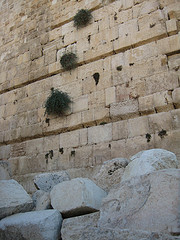 Tonight at sundown we enter into Tisha b'Av, a communal day of mourning. On Tisha b'Av we remember the fall of the First Temple in 586 BCE, and the fall of the Second Temple in 70 CE; we remember pogroms and tragedies throughout our history; we remember human suffering writ large; we recognize the brokenness in all creation; we enter into a process of communal teshuvah, repentance/return. For many of us this is a day of fasting and contemplation.
Tonight at sundown we enter into Tisha b'Av, a communal day of mourning. On Tisha b'Av we remember the fall of the First Temple in 586 BCE, and the fall of the Second Temple in 70 CE; we remember pogroms and tragedies throughout our history; we remember human suffering writ large; we recognize the brokenness in all creation; we enter into a process of communal teshuvah, repentance/return. For many of us this is a day of fasting and contemplation.
On the afternoon of Tisha b'Av, tradition tells us, Moshiach will be born -- our deepest hopes for redemption, entering our world at our moment of greatest mourning and sorrow. And beginning on the day after Tisha b'Av, we count forty-nine days -- seven weeks -- until Rosh Hashanah, the new year.
In the Tisha b'Av category on this blog are my writings about this day from the last several years, including a few poems (I am partial to As Tisha b'Av Approaches, 2012 and After the fall, 2011); an essay written the first year I fasted on Tisha b'Av (This year's wrestle with Tisha b'Av, 2011); and a series of vignettes from one year's observance at my small shul (Three scenes from Tisha b'Av, 2009.)
I also recommend The journey from estrangement to love to return, a post by Rabbi Sara Leya Schley of Jewish Renewal community Chochmat HaLev. She writes:
Tomorrow night is the 9th of Av, the culmination of period of consciously connecting with our estrangement from self, community and the Divine. Symbolized by the destruction of the Temple, Tisha b’Av brings us to confront what it means to live without a spiritual home, without the place where Shekhinah (the Divine Presence) is always waiting for us. By awakening to our suffering – personal and historical, we create an opening to profound self-awareness. Encountering and embracing the shadow diminishes the power of fear over our psyche.
The wisdom of our Tradition teaches us that mourning our losses, deeply feeling and acknowledging our brokenness in body, mind and soul, creates the opening for renewal. On this darkest of days, Moshiah is born: from the depths of destruction, springs the hope of transformation and redemption. Leonard Cohen famously reminds us "there's a crack in everything, that's how the light gets in"...
Her whole post is worth reading. In another interpretation (because if there's one thing to know about Judaism, it's that we always have other interpretations, other ways of understanding things) Tisha b'Av is a day of mourning the ways in which not only the Temple was destroyed, but our whole planet is in danger of destruction. Rabbi Arthur Waskow's Eicha for the Earth: the Text a Ceremony of Sorrow, Hope, & Action at The Shalom Center is an excellent read on that front.
Whatever your understanding of this day, and whatever your Tisha b'Av practices are: may your Tisha b'Av be meaningful and profound, a doorway into the transformation of the holy season which is about to begin.
Photo is mine, from 2008; Stones, wall, shrubs, taken at Robinson's Arch. The fallen stones were hurled down from the Temple Mount when the Romans sacked the Temple in 70 C.E.
Rachel Barenblat's Blog
- Rachel Barenblat's profile
- 6 followers


